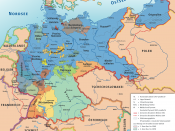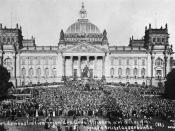The Weimar Republic was the democratic government that controlled Germany's politics during 1919 to 1933; its greatest achievement was the partial recovery of Germany's inflation problems after WWI, but other major problems such as the effects of Article 48, the inevitable Great Depression and the fact that it was created by the Treaty of Versailles led Weimar Republic to its end.
Article 48 stated that the President of Germany is enabled to gain full control over the German army regardless of the Reichstag's (the German Parliament) power in extreme situations. This article was used frequently by German Chancellor Heinrich Bruning during the 1930s; Bruning requested the President Paul von Hindenburg to provide him the authority to completely ignore the Reichstag by using the power of Article 48, and when Hindenburg granted his request, he used his power to bring German economy down to a new level by executing rules such as increasing taxes, reducing salaries and expanding the unemployed population.
Bruning's actions are perfect examples to reveal the weakness of Weimar Republic's constitution; Article 48 made the existence of the republic completely pointless- any president can be a dictator by using the power of the Article.
When the Great Depression struck the world in 1929, Germany was still in its recovery of inflation by the Dawes Plan (a report published to the Allied Reparations Committee by American banker Charles Dawes that suggested the ideas of lowering Germany's annual reparation and raising a loan of 800 million dollars to Germany), the Depression made Germany's unemployed population ascend from 1.32 million to 6.1 million, affecting every single German deeply. The Great Depression was not a problem that can be solved by Weimar Republic, but it did struck Germany like a thunderbolt, it brought Germany to its lowest point in economy.
The fact...


